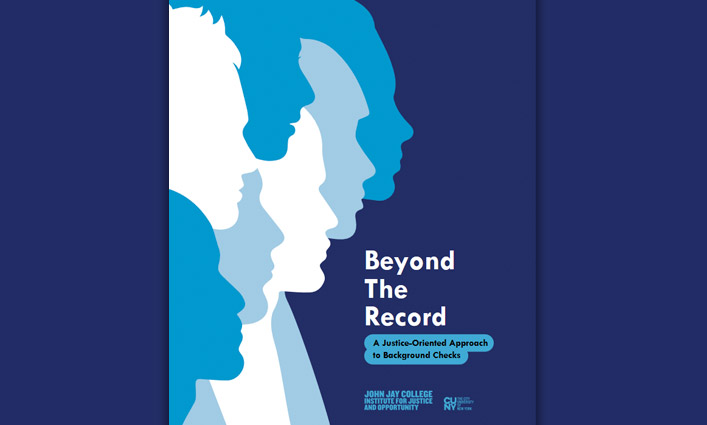
Beyond the Record: A Justice-Oriented Approach to Background Checks dispels myths and misinformation about conviction records
(NEW YORK, NY – SEPTEMBER 16, 2021) – Today, the John Jay College Institute for Justice and Opportunity released a groundbreaking guide for those who utilize background checks during their course of business. This guide is positioned to bring a more critical and well-rounded approach to this process, thereby advancing more equitable outcomes for all applicants in any field.
The guide, Beyond the Record: A Justice-Oriented Approach to Background Checks, is designed to help employers, educators, education and employment program operators, licensing bodies, and housing providers better understand the individual, institutional, and systemic barriers erected by background checks.
Over 77 million people have a criminal record in the United States. In New York City alone, nearly 750,000 New York City residents – almost 11 percent of adults -- have a criminal conviction, according to a recent report by another center at John Jay College – the Data Collaborative for Justice. The use of background checks to bar access to employment, licensure, housing, and education creates a system of perpetual punishment for the millions of Americans with conviction records.
But that pervasiveness speaks to an opportunity, too: as decision makers reviewing background checks, there are thousands of people who have the power to expand opportunity to candidates with conviction records right now. This guide will help them do just that.
“Criminal background checks tell us very little about the person before us right now. A list of old arrests and conviction is a flat and often inaccurate or misleading representation of past acts. Time has passed and people have grown and changed. It is who they are now that should matter to us—their aspirations, motivation, intelligence and commitment. We should be clearing the way, not erecting barriers, for people who want to contribute to their employers, their communities and their families,” said Ann Jacobs, Executive Director, John Jay College Institute for Justice and Opportunity.
This guide is a continuation of the Institute’s work to support people with convictions in navigating barriers to education and economic opportunity. Recent publications include Getting to Work with a Criminal Record: New York State License Guides (2020 Expanded Edition), which explains the process for obtaining licenses in 25, high-demand occupations and professions for people with conviction records; and Getting the Record Straight: A Guide to Navigating Background Checks, which helps people with conviction records navigate barriers erected by the practice of background checks.
About John Jay College Institute for Justice and Opportunity
As a champion of institutional, structural, and personal transformation, the Institute opens doors and eliminates barriers to success for people who have been involved in the criminal legal system. We create access to higher education and pathways to satisfying careers. We advocate for the right to housing, employment, healthcare, and other human rights too often denied people with criminal convictions. Our largest program, College Initiative (CI), helps make the college dreams of formerly incarcerated and court-involved men and women a reality by providing the guidance and practical assistance they need to enroll in college and succeed there.



